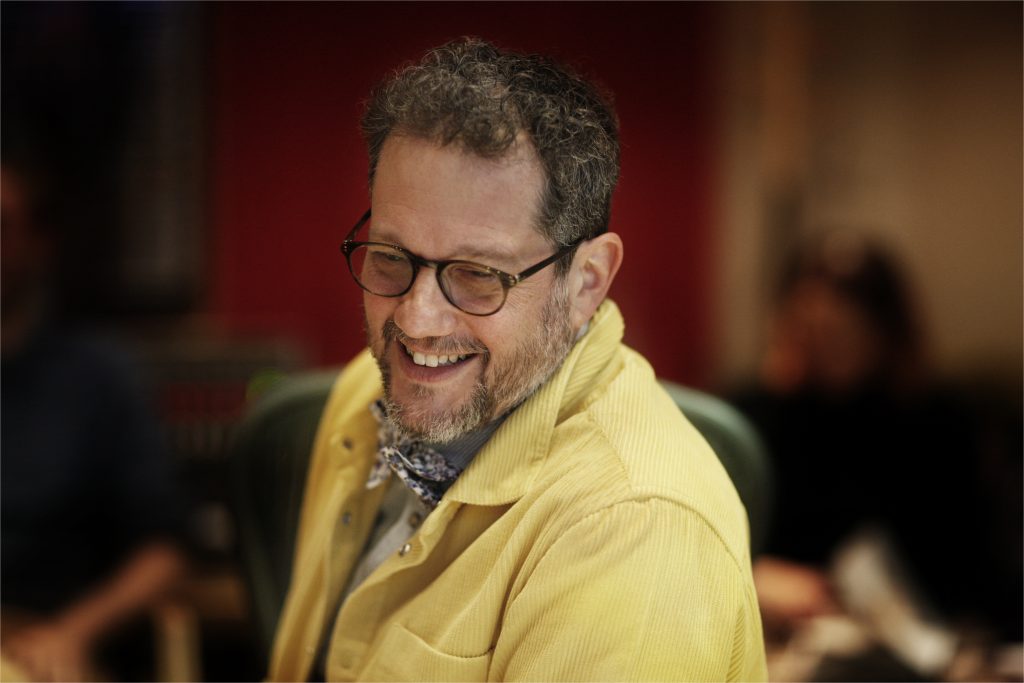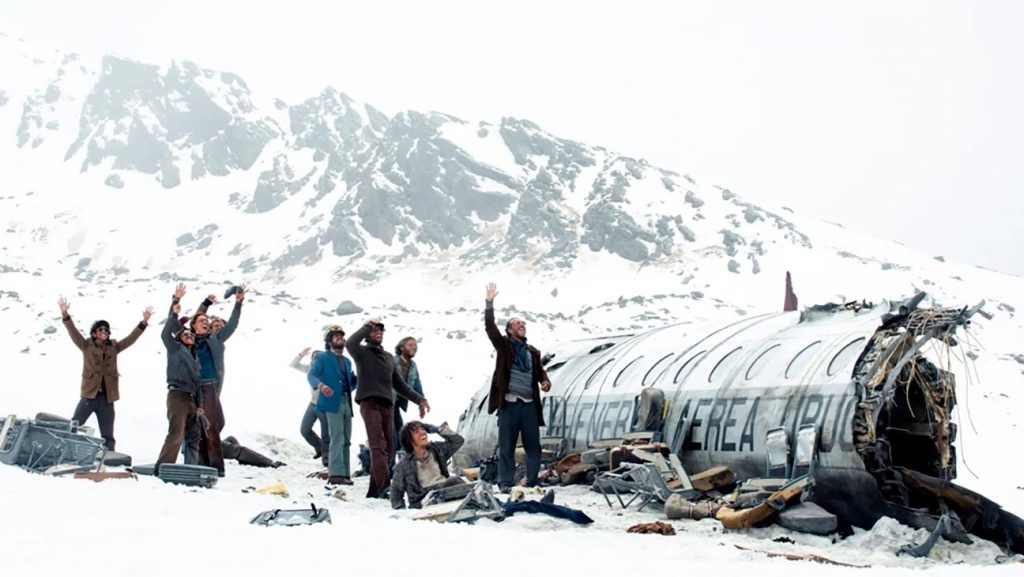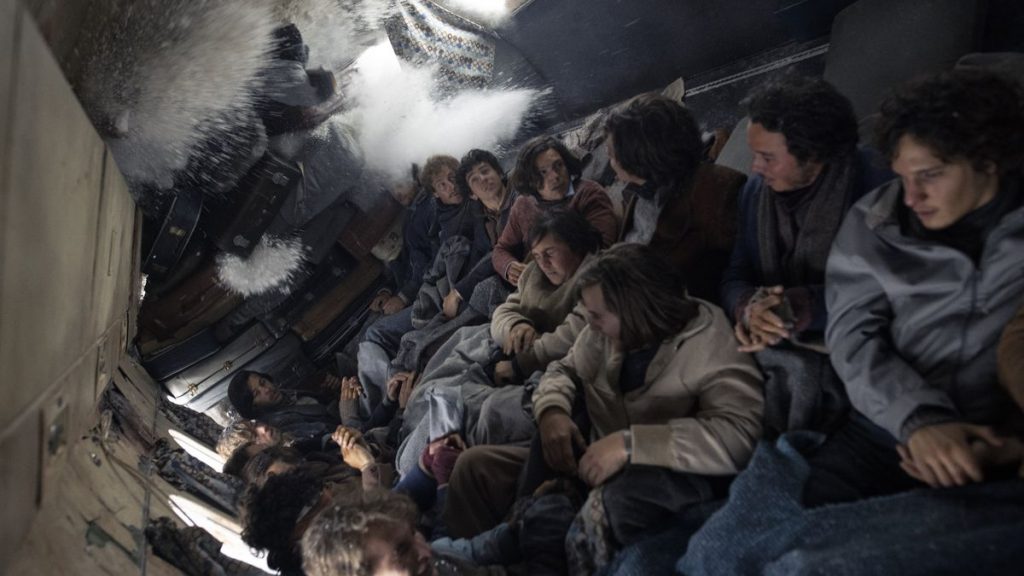
Michael Giacchino faced real-world responsibilities with his latest score for Society of the Snow. The composer is famous for scoring adventures in fantasy land, including several Pixar, Spider-Man, and Star Trek films, but with filmmaker J.A. Bayona‘s Society of the Snow, the composer tells a true story about survival, faith, and death.
It’s a tragedy about the survivors and the deceased of the 1972 Uruguayan flight.
Musically, Giacchino treats them all with respect. The score is introspective and quiet, never overt and maudlin. In other words, the composer doesn’t score Society of the Snow as a thriller or horror movie; he delicately emphasizes emotions and themes.
Recently, Giacchino spoke with Below the Line about his most recent collaboration with Bayona and why less was more for Society of the Snow.
[Note: This interview has been condensed for clarity and length]
Below the Line: You have several frequent collaborators, now including J.A. Bayona. When do you know you connect with a filmmaker, that you speak the same language for scoring a story?
Michael Giacchino: Well, he and I have known each other for a long time, and we were friends for many years before we worked together. And we’re both film nerds. We really connected over a lot of Richard Donner’s work, which we both love, especially Superman. And that was 14 years ago or so.
Whenever he would make a film, he would just bring it to me and I would watch it, whether it was The Impossible or A Monster Calls, and I would just give them my thoughts. I would just tell ’em more about editorial, more about music, more about story, all of those things. Our work relationship was more just as friends showing each other things and giving our thoughts.
And then when he made Jurassic World [Two], he called me and said, “Hey, they’re talking to me about maybe doing Jurassic World.” I said, “Oh, you should do it.” I called up the production, and I was like, “You guys, yes, he’s the best. It’d be so fun. We finally get to work together.”
When this film came about, I was not supposed to be scoring it. It was back to more like, “Okay, I’m going to show you my movie and tell me what you think about it.” We watched it here at the house and I loved it. We just started talking about the story and the music and everything, and I was in this place where I was just about to start working on Them for Warner Brothers, which I’m directing. And as we were talking that night, the news came through that the writer strikes started. And so, that put the project on a hiatus. And he looked at me, he goes, “Well, you have time now. Do you want to do this?”
And that’s how it kind of happened very organically like that. Most of my projects happen like that, where it’s more just through talking with friends, “Hey, I’m making this movie, and do you want to do it?” Almost never has it been going through an agent or someone calling blind just to say, “Hey, does he want to?” I have a great group of creative friends that I love working with.
BTL: That’s a good place to be. It just sounds like someone calling you up to hang out and make stuff, even on a large scale sometimes.
Giacchino: And that’s what it is. Working on stuff, that’s the feeling I want always. I never want it to feel like, oh, this is a job. It should be like, I’m excited to do this. Everyone should be excited to do it. No one should be rolling their eyes at the fact that they have to make this thing. We should all be wanting to make the best possible thing for the screen that we can. Bayona really fits right into that mold.

BTL: Here, you have so many characters, themes, and conflicts. It’s a big story, but you took a very restrained approach to it all. Was that your mission from the start?
Giacchino: Less is more in a film like this. You go in knowing that this happened, so you don’t have to be convinced that this is something that is being created in front of you. So right off the bat, you have that sort of baseline.
For me, I also didn’t want to [go big] because it was real people, I didn’t want to step on that. I didn’t need to do much more than support the emotions that were there, try and get into the heads of the characters, try to feel what they were feeling, and just be there.
The thing about music is it can so often be used as a crutch. So many movies have wall to wall music, and sometimes it’s a movie that benefits from it. A lot of times it’s the same as just sitting next to someone who’s poking you in the arm for two hours, and you’re like, “I get it. Stop already. You don’t need to tell me everything.” So, I tried to only be there when we needed to feel what they were feeling and be a part of that and not sensationalize it.
It’s a struggle. The entire thing is a struggle I can’t even imagine. And then after meeting the survivors, I felt even more of a responsibility to be as honest and truthful as I possibly could. This was a story I knew about since I was a kid. I heard about it when I was young, and my sister even wrote about it in her diary when it happened. It’s a far reaching story. I grew up in New Jersey about as far as where you can get from there. It’s a story that has been around for a long time, and I felt this obligation.
I know that Juan Antonio wanted to tell a story that was from the point of view of those who didn’t make it down from the mountain as opposed to making this a story about the survivors. Let’s make this about the people who didn’t come back. So, music was even more important in that sense because it was their voice in the end.
BTL: You can hear that in the end. It’s not a sound of pure freedom and triumph when the survivors are rescued. There’s still loss in the score.
Giacchino: Yeah, no, definitely. It holds on to the idea of what sacrifices the other people had to make in order for those few people to make it off the mountain. They gave literally everything to their friends so that they could survive, and that’s pretty powerful. And if you have that, it just forces you to be as gingerly, delicate with everything you do because one false move and it doesn’t feel real anymore.
BTL: A good example of that involves a monologue in the film about love and holding on to it. You play music toward the end of it, but again, it’s delicate. How did you decide how long to hold off for there?
Giacchino: Well, it’s always about holding off until you absolutely need music. At what point do you really feel like you need that to come in so you can underline the weight of what they’re feeling? And it really is that thing where you’re like, “No, not yet. Not yet. Wait, not yet. Okay, now let’s do it.” Sometimes you don’t know until you record something and you put it against it and you go, “You know what? We don’t really need the first half of that.”
And so, figuring out where there was no music was as important as figuring out where there was music. Once I record a score, I’m on the stage with everyone who’s dubbing, and I’m usually the one saying, “Oh, this cue, you don’t need it anymore.” Now that I see what the sound design has done for a particular thing, I can go, “Okay, I don’t need that because sound design or the actor does it.” A lot of it is removing what we don’t need and leaving only what you absolutely need.
BTL: I did want to ask more about your relationship with sound design. There’s a moment after the crash where survivors regain consciousness and it’s audible disorientation, and I couldn’t even tell, is that sound design or score?
Giacchino: It’s a little mix of both, I believe. But I love the sound crews and I love working with them on all these movies. One of my favorite things is trying to figure out, “Okay, where’s my moment and where’s your moment?” And also as a filmmaker, when I’m scoring things, I’m looking at stuff going, “Oh, there’s going to be this type of sound here or this thing there, so I’m going to stay out of the way of that. I’m not going to just plow over it.”
I think there’s a big conflict a lot of times between sound and music, especially when the composer is just like, “Well, this is my score and this has to be here.” There’s no communication in terms of, okay, what’s the best version of telling this story? How can we work together to do that?
I like working with them because then you get nuances. The stuff you’re talking about only comes when everyone is on board and talking to each other. Otherwise, I can’t tell you the stories that I’ve heard from other people that are just constantly fighting on the dub stage, which I don’t understand at all. I don’t get it. We’re all doing this together. It makes no sense to me.
BTL: Even on the bigger movies you work on, too, as loud as they can be, you want to let the audience’s ears rest, right?
Giacchino: For sure. Some of them are so loud and they don’t give you a break. Good storytelling is all about the ups and downs and good sound is the same thing all about the ups and downs, the dynamics of what you’re doing. You need to pay careful attention to that and not use it as something that is just blanketing entire piece of work that you’ve done.
BTL: Was it an immediate decision to not score the plane crash?
Giacchino: I never thought there should be music there. Then you’re in a situation where you’re like, “Is this an action movie? What is this?” You don’t want to do that. I think the reason that is so effective that scene and it’s so insane is partly no music in it. It feels real.
There’s something about music when you put over particular scenes that is a safety net or a security blanket. I think that that was a moment in the film where you don’t get to have a security blanket. You have to endure what they did, obviously in this safe way in the confines of a movie theater or whatever. But still, in order to get the emotions, that was a scene that should have no music.

BTL: Correct me if I’m wrong, but your score is more present in the foreboding and aftermath. During the action, the most horrifying moments, there’s the silence. There’s no breathing room for the characters, really. Is that an effect you wanted?
Giacchino: Absolutely. When there’s this one shot where the camera’s rising up over the mountains, the guys are walking along this ridge, and when they realize that, oh my God, there’s like 10 more mountain ranges that we have to cross; they were hoping to get over that ridge and see a path home. Normally on a moment like that, the tendency would be to get big and dramatic. For me, it was about doing the opposite. You get up there and there’s nothing. There’s just 10 more mountain ranges; everything you did to get where you are, you now have to do 10 more times. To me, it’s desperation and bleakness, not an overpowering giant film score moment that needed to be more.
BTL: Even your choir is very quiet throughout the movie.
Giacchino: Sometimes they’re literally just humming. They’re not even singing. For the choir, it was a chance to literally let them have the voice of the dead, let them be the voice of the dead and let them sing in phrases and in a language from that area. They’re singing in Mapuche, which is an indigenous language of the Andes.
The lyrics are all sort of about mother nature and love and hope and how you’ll be taken care of. It’s spiritual what they’re all singing. They were in London, that choir, and they were fantastic. They got all the pronunciations. They really worked hard and it was a really fun session.
BTL: Which instruments did you want to convey faith and spirituality?
Giacchino: Yeah, it was mostly the choir and then simple, simple, simple tones of either strings or weird synth pads sort of combined with the strings. When you’re dealing with those kind of things, the simpler the better. And even when there’s a big spiritual feeling when they’re rescued, too, it’s not a massively heroic moment. It’s more of a spiritual release.
I like to think it gives you a chance to finally breathe a sigh of relief for these people that some of them have made it. But the thing about it, when you get to that point, you can’t help thinking about the people that were left behind as well. It’s a story that is not just about those couple guys that made it — as awesome as those people are.
BTL: What are some deceptively simple elements of the score? What cues kept you up at night?
Giacchino: It was probably one of the hardest films I’ve ever had to work, because I really do come from a place of trying to get inside the character’s head and write music that feels like the emotions they’re feeling. When you’re doing that with a character like James Kirk or Carl Fredricksen from Up or Peter Parker from Spider-Man, that’s fine. You can do that because in the end, you know that this is a story you’re telling. It’s a fable in a way.
But when you’re doing it with this, you’re getting into some really dark, dark places and putting yourself in a position of feeling a lot of uncomfortable feelings. And for me, it’s the only way to really write music is to get there. This film forced me to live in that space for a long time; it was different from normally what I would have to do.
And then getting to meet the people that survived that event, it was an incredible gift. I get to see the joy that they still carry in their hearts, how they feel about life, how they approach all of that, the memories of their friends that they can still tell you every single thing about them. I mean, it’s really incredible. It’s incredible.
BTL: Like you said, you always try to put yourself in the footsteps of the characters, but what about the audience?
Giacchino: I do let them kind of make their own judgments. I’m always trying to just say, “This is how I feel. This is how I feel when I watch this.” So, that’s how the music’s going to feel here. I try to allow them to make their own call on what it is they’re feeling, and hopefully if I’m doing my job, they’re following me and they’re going to be in the right place feeling the same as the characters.
You want to be on the ground with the people in the story. You don’t want to be watching from a distance. The best movies are when you really feel invested and you feel. When something happens to someone on screen and it affects you, that’s good. You want that. That’s where I always want to be. I don’t want them thinking about it. I just want them experiencing it.
The Society of the Snow is now available to stream on Netflix.





